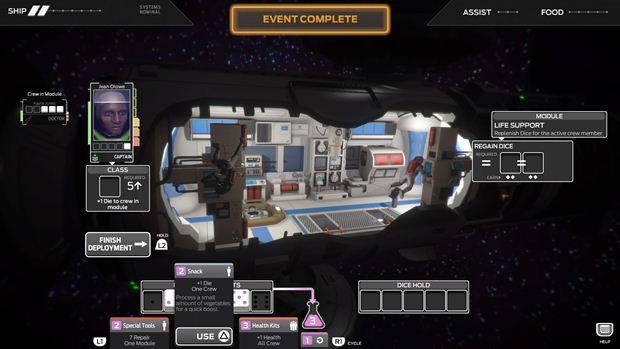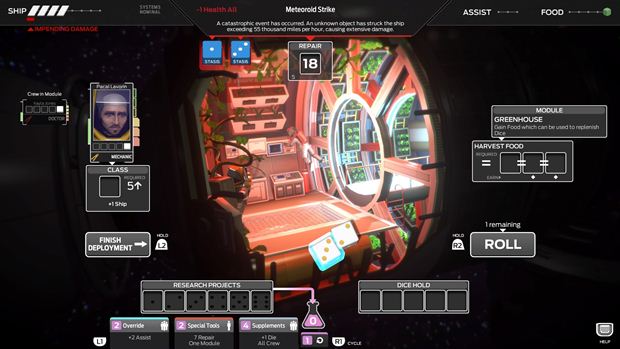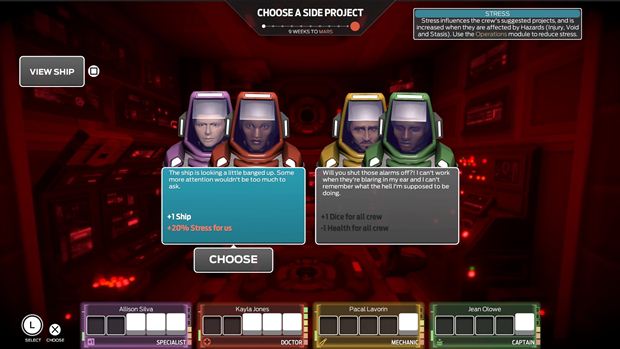
There I was, clutching my controller and hoping against all hope I’d roll a five. A one or a six would send the die into the void, and anything else would result in the destruction of my ship, and the death of my last remaining crew member. The crimson die, stained red after I had no choice but to devour my comrades, bounced three times before stopping with a thud. I got a one, truly the loneliest number. As I watched the die vanish into the reaches of space, I wondered why I didn’t use my research points earlier to call home one last time…
Situations like these are what you can expect to find yourself in thanks to Choice Provisions and their tabletop of a videogame, Tharsis.
In Tharsis, you control four crew members of the Iktomi, Earth’s first manned space shuttle to Mars. You sit on board and watch a movie and everything goes well. It’s an odd game, you don’t actually do anything… just kidding, everything goes wrong incredibly quickly, because of course it does. The Iktomi somehow piloted itself into the middle of a micrometeoroid cluster, and it’s up to you to repair the constant onslaught of damage.
"This game fits nicely into the “easy to learn, hard to master” category as well. It begins innocently enough with the basics: the ship is divided into different rooms that each have a certain number of damage dealt to them by the micrometeoroids."
Each game begins with one of the original five crew members dying in a cutscene, a wonderfully macabre way to start a mission that was once full of hope. It also perfectly sets the tone for what’s to come, i.e. constant misery. Tharsis is a rougelike, the kind of game that prides itself on being impossible to beat in your first – and likely second, third, fourth and so on – playthroughs. This also means that your actions carry over between games. As well as the player’s own personal skills leveling up, so to speak, progress is made on five individual challenges. Once completed, these challenges will unlock new crew members with different abilities, though you’re still only allowed four crew members per game.
Gameplay manifests itself in the form of a tabletop game, building its core mechanics around the roll of dice. There’s been a surge of board game video games as of late, and anyone who’s played them can tell you they usually fall into two categories. On one hand, there’s something like Blood Bowl II, another tabletop videogame that relies heavily on luck above all else. Tharsis falls into the second category, one that’s built around player skill, and not on luck.
This game fits nicely into the “easy to learn, hard to master” category as well. It begins innocently enough with the basics: the ship is divided into different rooms that each have a certain number of damage dealt to them by the micrometeoroids. Your job is to decide where to send which crew member, roll the die, and use the die to bring that number down to zero. From there, things get increasingly complicated as you have to take several factors into consideration.
You have to survive for ten full turns, and that time doesn’t go by as quickly as you might expect. If you fail to repair a room before the end of a turn, bad things will happen. The ship’s hull will get damaged, the O2 module will stop producing oxygen resulting in your crew losing health, and food production will cease giving you fewer dice to work with, just to name a few of the fun ones. Each room has its own special ability, such as food production, or giving you preventing and healing injuries. Even if the room isn’t damaged, it may be worth sending a crew member there anyway for the extra benefits.
"In one playthrough, my ship was down to only two hit points. Both choices at the end of my last turn would deal my ship two damage, and just like that, the game was over."
Even still, it’s not a simple matter of rolling white cubes and hoping for straight sixes. Choices and consequences play a big factor in the game. In between turns, your crew members will divide in two groups of two, offering you different side projects. These side projects can reduce or raise stress of the crew members, depending on whose project you choose. The higher the stress of your crew members, the worse choices you’re given as your crew is driven into psychosis.
Each choice has good and bad consequences. You might feed half your crew at the cost of starving the other half, or you could give more die to certain crew members and damage the hull of your ship. Many of the positive effects don’t seem to be that helpful, nothing some extra food and a phone call home couldn’t solve anyway. The negative effects usually end up crippling you in the long run, as you have to sacrifice ship health and number of dice. They can also be unfair in other ways.
In one playthrough, my ship was down to only two hit points. Both choices at the end of my last turn would deal my ship two damage, and just like that, the game was over. It seems like an odd decision by the developers, because they usually go through great pains to make the game as fair as possible. If you’re ever in a situation where your entire crew has to lose one or more dice, anyone who’s already down to just one die won’t lose any. It’s little things like that which make the game well balanced, but occasionally there will be situations that make you feel powerless.
Another of these situations is with the Assist mechanic. In any given room, there can be three different negative effects on your dice. Stasis freezes your die, meaning that one will stay in place if you choose to re-roll the others. Injury will injure the crew member you’re currently commanding, and Void will send one of your die into space so you can no longer use it. Where these hazards are placed is randomized, as is the number they’ll activate on. For example, if there’s a Void die in a room with a six on it, any sixes you roll will vanish.
"Tharsis is like the swimming pool at your local rec center, and the game is more than happy to toss you off the diving board into the deep end before you put your swimsuit on."
To counteract this, there are Assists in the game that will automatically block these hazards. These Assists are automatic, and you has no agency over them. This creates situations where you might want to block an Injury die, but the Assist will automatically block a Stasis one instead. In another of my playthroughs, I was in this exact situation, and my crew member died in anticlimactic fashion. Yes, I knew the risk going in, but I still feel I was cheated that time around.
It’s a shame, because the beauty of Tharsis is that it gives you the information you need to make well informed decisions. Everything from how much food you have, how many die each crew member has, their health, the health of the ship, your current research projects, and your Assists is given to you throughout the UI. The random elements in the game, such as what room will get damaged, how much damage they take, and the roll of the dice are things you have to adapt to.
Except for rare situations like those mentioned above, Tharsis is a game that’s meant to be challenging, yet fair. It’s a lot like Dark Souls in that most of your deaths are your fault, and you have learn from those mistakes to progress.
If there’s one negative quality about Tharsis, it’s that it’s too earnest. All the game’s mechanics are incorporated into gameplay from the start, and they aren’t well explained by the tutorial. Tharsis is like the swimming pool at your local rec center, and the game is more than happy to toss you off the diving board into the deep end before you put your swimsuit on. For some it’ll be fun trying to navigate the challenges of the game’s complex systems from the start, but others will find it an exercise in frustration. This also means the game bursts its load at the start, leaving nothing new to be discovered in later turns, with one exception.
If at any point you run out of food, you can always turn to cannibalism. After your third turn, you can eat any dead crew members, including the guy who dies at the start. It’s another choice you have to make in a massive ecosystem of choices and consequences, and it’s the only mechanic that’s locked at the start of the game. If there were only one or two more curveballs that emerged throughout later turns, it would have made the later rounds tenser. As it stands, once you make it to a certain point the edge wears off and you fall into a routine, a routine that’s still fun, but a routine nonetheless.
There is a story to Tharsis, however it’s more of a setup for the scenario more than an engaging narrative. A cutscene at the start of the game sets up the manned mission to Mars, and short twenty second scenes punctuation the end of each turn with an update on the crew members psyche. A new plot thread emerges about some mysterious signal coming from the big red giant, but it’s hardly something that’ll keep you at the edge of your seat. The voice acting is well delivered however, properly setting the tone of a frightened captain in space who has little idea what they’re doing.
"Tharsis might not be the most original game around, but it’s a great step for the emerging electronic board game genre."
The acting is wasted on the visuals however, as cutscenes are nothing more than a few static images in a slideshow. They’re well drawn, but they’re all vague, depicting generic images of a space ship that could the Iktomi, or it could also be the International Space Station, and flat patches of red land that’s supposed to be Mars, but looks dull and without personality.
As a final note, this is the PS4 version of the game. I wanted to test how the game ran and controlled, knowing everyone else would go for the PC version. Hold R2 to roll, select menus and crew members with the DPad or analog stick, and end turns by holding L2, it’s that simple. The sound of the die rolling and clacking into each other comes through the speaker on the Dualshock, and it adds a nice layer of ear-gasm inducing depth to the simple but effective audio.
Tharsis might not be the most original game around, but it’s a great step for the emerging electronic board game genre. Baring a few exceptions, it’s built around providing a tough but fair experience, full of depth and constantly engaging content.
This game was reviewed on the PlayStation 4.
Tharsis prides itself on being tough but fair, easy to learn but hard to master. It’ll likely take you a long time to last survive all ten turns, but you’ll have a great time getting there solving increasingly complex challenges. Juggling so many different fires at once is stressful and tense, and the atmosphere of the opening cutscene makes the game feel like a survival horror.
There are rare moments where the game forgets to be fair, and forces you to an early grave. There are a lot of complex gameplay elements thrown at you at once, leaving no new content for later turns. The story, while not awful, isn’t nearly as well explored as it could have been.




















